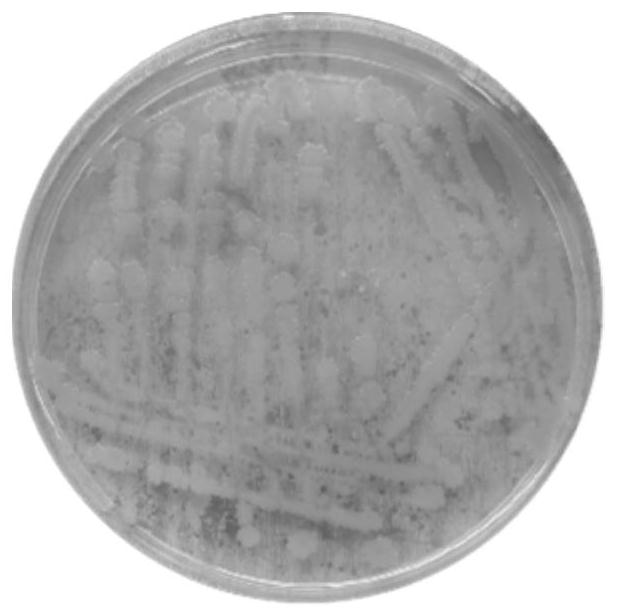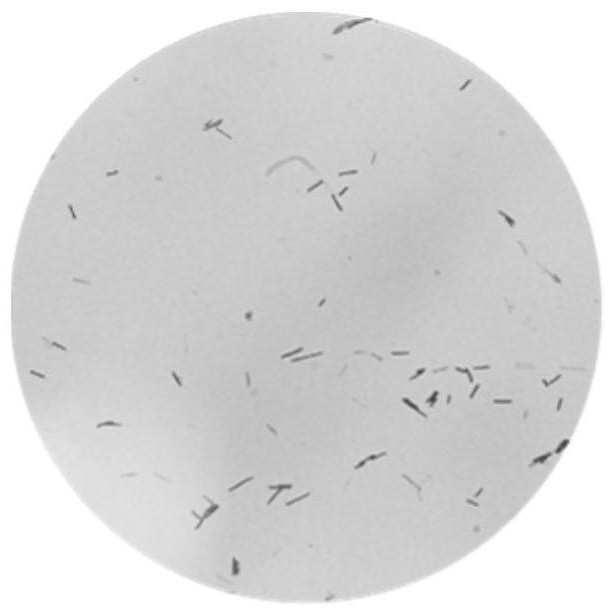Bacillus subtilis with capability of efficiently degrading gossypol and application thereof
A technology of Bacillus subtilis and Lactobacillus plantarum, applied in the field of microbial technology and feed application, to achieve the effects of reducing the death rate, improving the palatability and digestibility of feed, and improving the production performance of broilers
- Summary
- Abstract
- Description
- Claims
- Application Information
AI Technical Summary
Problems solved by technology
Method used
Image
Examples
Embodiment 1
[0021] Isolation, screening and identification of embodiment 1 bacterial strain
[0022] 1 Materials and methods
[0023] 1.1 Test material
[0024] 1.1.1 Samples come from cotton field soil.
[0025] 1.1.2 Medium
[0026] Enrichment medium: 1% cotton meal, 1% glucose, 1% sucrose, 0.1% magnesium sulfate, 0.1% potassium dihydrogen phosphate, natural pH, sterilized at 121°C for 20 minutes.
[0027] Primary screening medium: ammonium sulfate 5g, potassium dihydrogen phosphate 1g, sodium chloride 0.1g, magnesium sulfate 0.5g, calcium chloride 0.1g, yeast extract 0.2g, agar 20g, distilled water 1000ml, 0.1% or 0.2% cotton acetate Phenol (pre-dissolved in acetone).
[0028] Re-screening medium: according to different strains, select potato dextrose water, nutrient broth, MRS broth medium, add gossypol acetate solution (25mg / ml) to it to make the final concentration 500mg / L.
[0029] 1.2 Test method
[0030] 1.2.1 Enrichment of gossypol-degrading bacteria
[0031] Weigh 10 g o...
Embodiment 2
[0052] Example 2 Strain YB-10 solid-state fermentation of cotton meal
[0053] 1 Materials and methods
[0054] 1.1 Test material
[0055] Cotton meal: Xinjiang cotton meal.
[0056] Bacteria: the YB-10 bacteria screened in Example 1.
[0057] 1.2 Medium
[0058] Seed medium: Nutrient broth medium.
[0059] Solid-state fermentation medium: cottonseed meal 100g, glucose 2g, tap water 40ml.
[0060] 1.3 Test method
[0061] The screened test strains were inoculated into the liquid seed medium, and cultured on a shaker at 160 rpm for 20 hours at 37°C. Then add the seed solution into the solid-state fermentation medium according to the amount of 10% of the mass of cotton meal, put it into a sealed bag, mix it evenly, expose it, and cultivate it at 30°C for 48 hours, and turn over the material every 12 hours. After the fermentation, the fermented cottonseed meal was placed in an oven at 65°C and dried for 4-6 hours to make an air-dried sample, which was crushed through 40 me...
Embodiment 3
[0081] Embodiment 3 mixed bacteria solid-state fermentation cotton meal
[0082] 1 Materials and methods
[0083] 1.1 Test material
[0084] Cotton meal: Xinjiang cotton meal.
[0085] Bacillus subtilis: the YB-10 bacteria screened in Example 1.
[0086] Saccharomyces cerevisiae: JM-4, JM-6.
[0087] Lactic acid bacteria: Lactobacillus plantarum RS-1, Enterococcus faecium RS-6.
[0088] 1.2 Medium
[0089] Seed culture medium: nutrient broth, for cultivating Bacillus subtilis; potato dextrose water, for cultivating Saccharomyces cerevisiae; MRS broth, for cultivating lactic acid bacteria.
[0090] Solid-state fermentation medium: cottonseed meal 100g, glucose 2g, tap water 40ml.
[0091] 1.3 Test method and test design
[0092] The gossypol-degrading bacteria YB-10 is used as the main fermentation bacteria, combined with yeast and lactic acid bacteria for fermentation. The test strains were inoculated into the corresponding liquid seed medium, and cultured on a shaker ...
PUM
 Login to View More
Login to View More Abstract
Description
Claims
Application Information
 Login to View More
Login to View More - R&D
- Intellectual Property
- Life Sciences
- Materials
- Tech Scout
- Unparalleled Data Quality
- Higher Quality Content
- 60% Fewer Hallucinations
Browse by: Latest US Patents, China's latest patents, Technical Efficacy Thesaurus, Application Domain, Technology Topic, Popular Technical Reports.
© 2025 PatSnap. All rights reserved.Legal|Privacy policy|Modern Slavery Act Transparency Statement|Sitemap|About US| Contact US: help@patsnap.com



